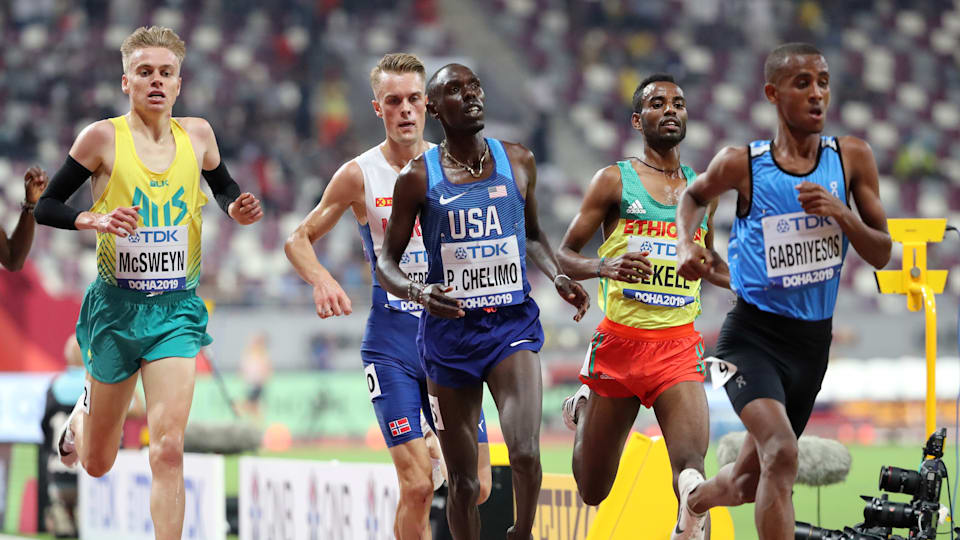Get to know Tachlowini Gabriyesos: Marathon man going all out to make the IOC Refugee Olympic Team
In March 2021 Gabriyesos became the first refugee athlete to clock an Olympic qualifying standard for the Tokyo Games, now he’s training hard to prove that everything is possible.

Tachlowini Gabriyesos fled Eritrea at only 12 years of age but a love of running and athletics has been with him every step of the way.
Emerging as promising marathon runner, crossing great distances is nothing new for Gabriyesos, his extraordinary journey has taken him through his native Eritrea, northwards across Sudan and Egypt where he crossed the desert on foot to reach Israel.
Now he lives and trains in the Israeli capital Tel Aviv where he runs with the Emek Hefer club, supported by an IOC Refugee Athlete Scholarship.
At 23 years of age he is one of the most exciting talents vying for a place on the refugee team that will travel to the Tokyo 2020 Olympics this summer in 2021.
A middle and long distance runner, Gabriyesos has competed over 3000m, 5000m, 10,000m, the half marathon and the marathon in 2020 and 2021, making a steady progression to the longer distances through his commitment and hard work.
As a refugee athlete the obstacles have been great from the beginning, but physical endurance, mental strength and a positive outlook define this remarkable athlete.
Gabriyesos is one of the IOC Refugee Athlete Scholarship-holders in contention to be part of the IOC Refugee Olympic Team for Tokyo 2020, which will be announced in June 2021.
Chosen as one of six athletes to compete for the Refugee Team at the Doha 2019 World Athletics Championships, Gabriyesos suffered a big setback before he even got there.
On a routine transit stopover in Istanbul a visa issue arose and he was forced to stay in the Turkish airport for 27 hours. As a preparation for an elite athlete facing the best in the world, it was a devastating blow to his chances of competing in the race.
In July 2019 Gabriyesos had set a new personal best of 14:15.05 in the 5000m, but in the heat in Doha could only manage 14:28.11.
Still, in typical fashion, he found the positives to take away, telling World Athletics:
“The competition was tough, but I will be stronger the next time, I know I’m not at the top level but now I know what it’s like to compete with and against the top level.”
Then in October 2020 he was ready to represent the Refugee Team again in the half-marathon world championships in Gdynia, Poland, but once more visa issues got in the way and he wasn’t able to travel.
For a refugee athlete, the obstacles off the track can be greater than the challenge of opponents on the track, sometimes just getting to meets or being allowed to compete is victory in itself.
"Giving up isn't me" - Tachlowini Gabriyesos
An ability to take all these setbacks in his stride and keep training harder makes Gabriyesos the formidable athlete he is today, two months after that disappointment in Poland he ran a half-marathon lifetime best of 1:02:21.
And three months later he ran a 2:10:55 marathon at Hula Lake Park in Israel on 14 March 2021 to become the first refugee athlete to go under an Olympic qualifying standard.
Oh, and it was only his second official marathon. Ever.
With everything that’s happened in a completely unpredictable year and a half through visa and status issues and all the disruptions and restrictions of a global pandemic, somehow Tachlowini Gabriyesos has even found a way to get faster.
"I think I'm in better shape than I was last year,” he told World Athletics in May 2021, “but physically and mentally it was hard to train with the pandemic restrictions."
The focal point of Tokyo has given him a clear goal to aim at.
"The Olympics is my dream as a professional athlete and it would be a great honour to be part of the [IOC] Refugee Olympic Team," he said.
"I want to show others that everything is possible and they shouldn't give up."
